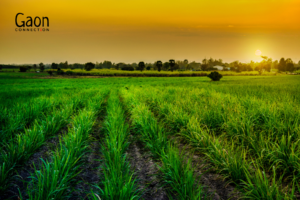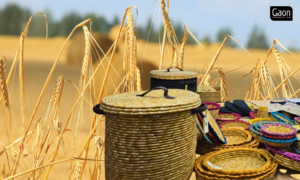The hilly areas of Koraput and Nuapada are dotted with bright red spots. Strawberry farming is transforming the lives of 40 adivasi families living in the picturesque hills of these tribal-dominated districts of Odisha.
Tribal inhabitants have been actively encouraged by the state government with financial and technical support to take up cultivation of the berries for an additional source of income.
Thirty women farmers belonging to the Kutia Kondh tribe from the villages of Janiguda, Galigadur, Fatusiner and Doliamba in Koraput district, and ten farmers belonging to Chukia Bhunjia tribe from the villages of Jhunapani, Sonabahili, Kuturabera, Salepada, Chinmundi and Sunabeda in Nuapada district, are actively involved in cultivating strawberries. Chukia Bhunjia is a particularly vulnerable tribal group (PVTG), one of the most vulnerable tribal groups.
Also Read: Post-harvest cold storage unit puts smiles back on the faces of farmers in Odisha
A year ago, in 2021, the Integrated Tribal Development Agency (ITDA) helped 30 tribal women from four villages in Koraput district to cultivate strawberries for the first time over five acres of land at Doliamba village in the district. The women belonged to three self-help groups (SHGs) namely Ma Subadra, Ma Tarini and Ma Barua. Today these tribal women are successful strawberry farmers.
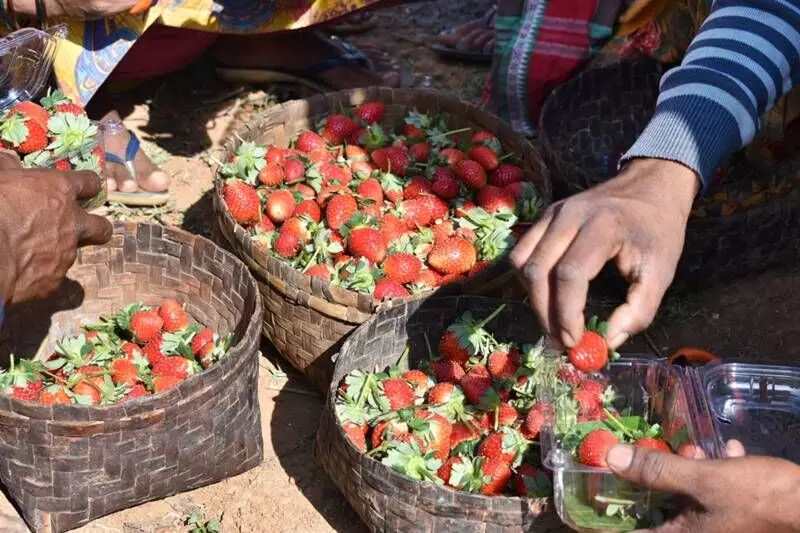
Saplings were planted in the last week of October 2022 and in December, 2022, almost 100 quintals of strawberries were harvested from one acre of land.
“We provided freely strawberry saplings to 30 women farmers from Janiguda, Galigadur, Doliamba and Fatusineri villages in Koraput district, and they raised strawberries over 20 acres of land,” Karu Soren, Project Administrator of Integrated Tribal Development Agency, Koraput, told Gaon Connection.
The same year, in 2021, strawberry farming took up over ten acres of land in two villages coming under the Sunabeda gram panchayat in Nuapada district.
“We provided saplings and other help to ten tribal families to raise strawberries over ten acres of land,” Himansu Kumar Mohapatra, special officer at Chuktia Bhunjia Development Agency (CBDA), Nuapada, told Gaon Connection. The Chuktia Bhunjia Development Agency was set up by the state government in 1994 for the welfare of the Chuktia Bhunjia PVTG.
Also Read: Tamarind cakes aid incomes of tribal women in Odisha’s Rayagada
“To grow strawberries, we received financial help and support from CBDA [Chuktia Bhunjia Development Agency],” Bijay Jhankara, a tribal farmer from Sonabahili village in Nuapada district, told Gaon Connection. “We began strawberry farming for the first time, in October 2021, and made a profit of six lakh rupees from one acre of land,” he said.
Koraput and Nuapada districts are located at an elevation of around 3,000 feet above sea level, and their cool climate is suitable for strawberry cultivation.
“Strawberries sell for about Rs 400 a kilo in the local markets at Nuapada, Komana, Sinapali, Khariar and other places in the district, and the farmers made a profit of around Rs 5 lakh to 6 lakh rupees per acre,” Mohapatra of Chuktia Bhunjia Development Agency said.
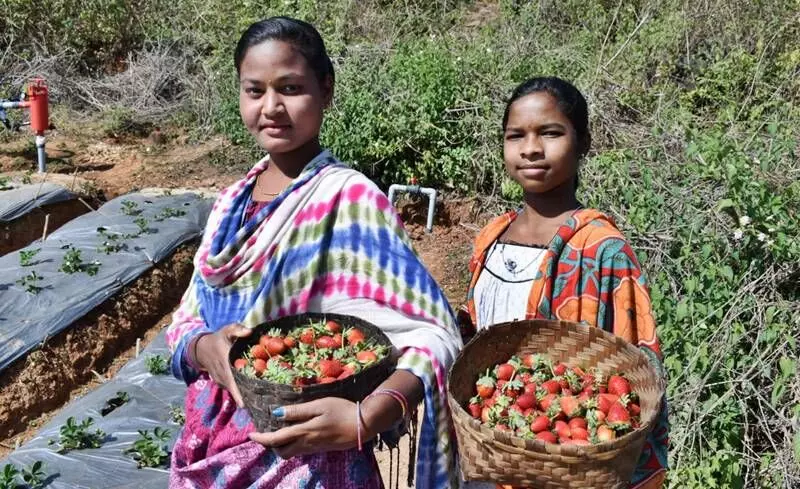
Tribal inhabitants have been actively encouraged by the state government with financial and technical support to take up cultivation of the berries for an additional source of income.
According to him, the district administration has also helped the Chuktia Bhunjia PVTG households through the Sunabeda Naturals Producer Group that markets the berries under the ‘Sunabeda Strawberries’ brand.
“Sunabeda Strawberries” Marketed by Sunabeda Naturals Producer Group it is an innovative Livelihood intervention for Chuktia Bhunjia PVTG Households by the District Administration.@CMO_Odisha@OPELIP_Odisha @MoSarkar5T @krushibibhag pic.twitter.com/msMbBEVVLS
— Collector & DM, Nuapada (@DM_Nuapada) December 22, 2022
Meanwhile, the strawberries from the villages of the Koraput district are marketed as Kotia Strawberries.
#Kotia strawberry cultivation started at Doliamba village providing the villagers with new livelihood avenue, many thanks to @dmkoraput @IKoraput for the #fruitful intervention pic.twitter.com/BYp2RUlWRk
— BDO Pottangi (@BDOpottangi) February 22, 2022
The lucrative prices the farmers received in this winter season has led to the state government planning to increase the acreage of strawberry cultivation to 60 acres by the next season, Mohapatra said. The administration is also enabling farmers to market their harvest in Cuttack, Bhubaneswar and other towns and cities of the state, he added.
“The strawberries grown here are already making news and many buyers are showing interest in bulk purchases,” Mohapatra said.
According to Soren, the ITDA official, the ‘winter dawn’ variety of strawberry saplings were procured from a government farm in Mahabaleshwar in Maharashtra. “Each sapling costs Rs 30, and a farmer needs about 11,000 saplings for an acre of land.
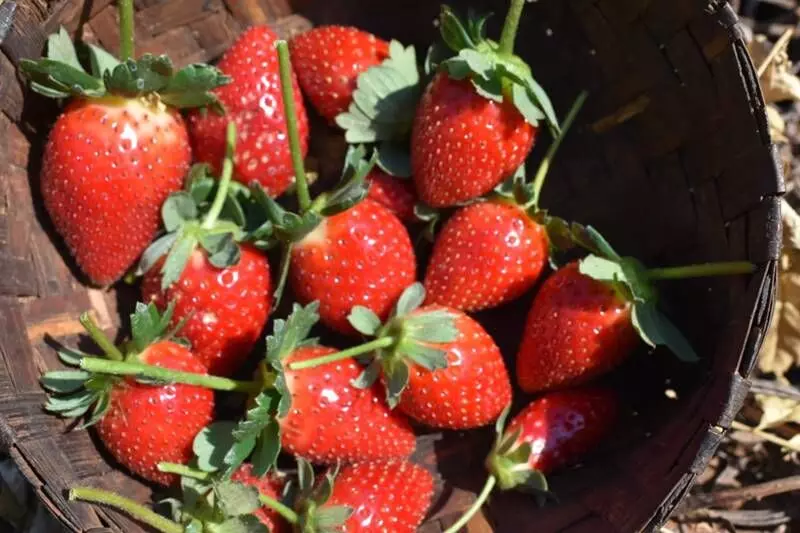
Strawberry farming is transforming the lives of 40 adivasi families living in the picturesque hills of these tribal-dominated districts of Odisha.
“ITDA spent around Rs 6 lakh to raise strawberries over an acre of land and the farmers earned a profit of up to Rs 6 Lakh from that one acre,” Soren said. On an average, strawberries take roughly 45 days before they are ready to be harvested.
Also Read: Kuchinda chillis add spice to farming in Odisha
The farmers were briefed about the benefits of strawberry farming. Various training sessions were held to tell them the best way to go about the cultivation and supplementary support such as linking them to markets, helping them in irrigation, etc were extended to them. “We provide saplings and train them to plant the saplings in a perfect way. The officials of the horticultural department also help farmers to grow strawberries in the land they own,” added Soren.
“Officials from ITDA explained the benefits of growing strawberries and we decided to try growing them in our village, after we got financial support from them,” Mata Gomanga, a woman tribal farmer from Doliamba village in Koraput district, told Gaon Connection.
“Our samooh [SHG] Ma Baruna earned around five lakh from an acre of strawberries in 2021,” she added.
According to Soren, saplings were planted in the last week of October 2022 and in December, 2022, almost 100 quintals of strawberries were harvested from one acre of land. When they are not cultivating strawberries, the tribal farmers grow chillies, brinjal, tomato and other seasonal vegetables.
Meanwhile, harvesting is going on in 20 acres of land in Koraput and 10 acres in Nuapada district. “In some places the crops will be yielding till March 2023,” Mohapatra said.








